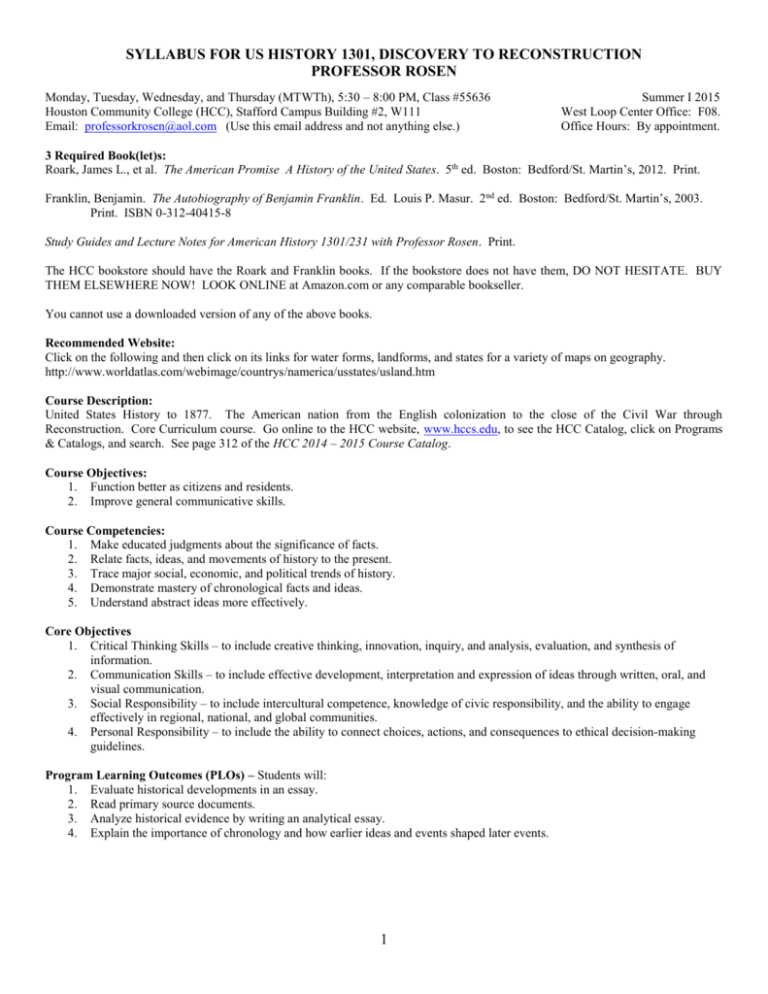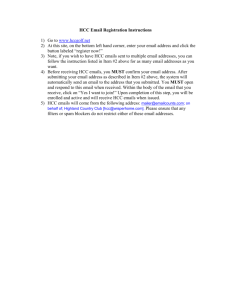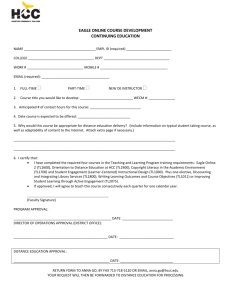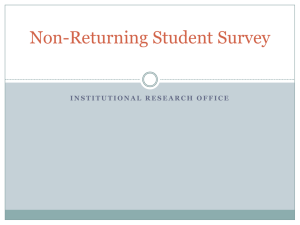
SYLLABUS FOR US HISTORY 1301, DISCOVERY TO RECONSTRUCTION
PROFESSOR ROSEN
Monday, Tuesday, Wednesday, and Thursday (MTWTh), 5:30 – 8:00 PM, Class #55636
Houston Community College (HCC), Stafford Campus Building #2, W111
Email: professorkrosen@aol.com (Use this email address and not anything else.)
Summer I 2015
West Loop Center Office: F08.
Office Hours: By appointment.
3 Required Book(let)s:
Roark, James L., et al. The American Promise A History of the United States. 5th ed. Boston: Bedford/St. Martin’s, 2012. Print.
Franklin, Benjamin. The Autobiography of Benjamin Franklin. Ed. Louis P. Masur. 2nd ed. Boston: Bedford/St. Martin’s, 2003.
Print. ISBN 0-312-40415-8
Study Guides and Lecture Notes for American History 1301/231 with Professor Rosen. Print.
The HCC bookstore should have the Roark and Franklin books. If the bookstore does not have them, DO NOT HESITATE. BUY
THEM ELSEWHERE NOW! LOOK ONLINE at Amazon.com or any comparable bookseller.
You cannot use a downloaded version of any of the above books.
Recommended Website:
Click on the following and then click on its links for water forms, landforms, and states for a variety of maps on geography.
http://www.worldatlas.com/webimage/countrys/namerica/usstates/usland.htm
Course Description:
United States History to 1877. The American nation from the English colonization to the close of the Civil War through
Reconstruction. Core Curriculum course. Go online to the HCC website, www.hccs.edu, to see the HCC Catalog, click on Programs
& Catalogs, and search. See page 312 of the HCC 2014 – 2015 Course Catalog.
Course Objectives:
1. Function better as citizens and residents.
2. Improve general communicative skills.
Course Competencies:
1. Make educated judgments about the significance of facts.
2. Relate facts, ideas, and movements of history to the present.
3. Trace major social, economic, and political trends of history.
4. Demonstrate mastery of chronological facts and ideas.
5. Understand abstract ideas more effectively.
Core Objectives
1. Critical Thinking Skills – to include creative thinking, innovation, inquiry, and analysis, evaluation, and synthesis of
information.
2. Communication Skills – to include effective development, interpretation and expression of ideas through written, oral, and
visual communication.
3. Social Responsibility – to include intercultural competence, knowledge of civic responsibility, and the ability to engage
effectively in regional, national, and global communities.
4. Personal Responsibility – to include the ability to connect choices, actions, and consequences to ethical decision-making
guidelines.
Program Learning Outcomes (PLOs) – Students will:
1. Evaluate historical developments in an essay.
2. Read primary source documents.
3. Analyze historical evidence by writing an analytical essay.
4. Explain the importance of chronology and how earlier ideas and events shaped later events.
1
SYLLABUS FOR US HISTORY 1301, DISCOVERY TO RECONSTRUCTION
PROFESSOR ROSEN
Student Learning Outcomes (SLOs) – Students will be able to:
1. Discuss the Age of Exploration.
2. Explain colonization.
3. Identify the causes and effects of the American Revolution.
4. Explain the origins and impact of slavery.
5. Analyze the formation of the Republic.
6. Summarize the effects of expansion and innovation.
7. Explain nationalism and sectionalism.
8. Discuss the Civil War.
9. Evaluate the effects of Reconstruction.
Americans with Disabilities Act (ADA):
Students with special needs or disabilities, which may affect their ability to succeed in college classes or participate in college
programs/activities, should contact Dr. Becky Hauri, the Disabilities Support Services (DSS) counselor located at the college. If so
certified, faculty will take appropriate steps to accommodate the disability. Go online to the HCC website, www.hccs.edu, click on
Current Students, click on Disability Services, click on How to Receive Accommodations, and search. See page 50 of the HCC 2014
– 2015 Course Catalog.
Attendance:
Habitual tardiness, early departures, and talkativeness are disruptive and unacceptable. Any student who misses the first two days of
class (first day for one-day-a-week classes) will be dropped automatically by the system with no chance of reinstatement regardless of
the reason. HCC policy states that students may be administratively withdrawn if they miss more than 6 hours of class. Students who
have not passed with a score of at least a 60 on either of the first two examinations and who have excessive absences, more than
12.5% of the hours of instruction: more than six hours, will be administratively withdrawn. Go online to the HCC website,
www.hccs.edu, click on Current Students, look at Student Support, click on Student Handbook, click on Academic Info, and read page
2. See page 43 of the HCC 2014 – 2015 Course Catalog.
Regular attendance is essential to success in this class. Students who have excessive absences are usually those most likely to earn a
substandard or failing grade. If you miss a class, you are responsible for all the information and assignments covered in that class.
Students who must complete 12 hours per semester to maintain their status – international students, veterans, financial aid recipients,
et cetera – should make special note of the attendance policy. You should be aware that under most circumstances a withdrawal that
brings you below the 12-hour minimum can result in a potentially damaging change in status. See page 21 of the HCC 2014 – 2015
Course Catalog.
Students with any combination of more than one absence, tardy, and or early departure in the classes immediately preceding a test will
not be eligible to receive a curve on the test.
Behavior:
All electronic devices need to be turned off, including laptop computers and cellular telephones, off the desk and lap, and out of sight.
Any student who is text-messaging, using a cellular telephone, or is disruptive will be told to leave immediately.
Course Load:
Generally, a student in academic courses needs two hours of preparation outside of class for each hour of classroom instruction.
Consequently, a student who is employed while attending college should consider the total demands on time from work, classes, and
activities when deciding on a course load. Students who overload themselves may have scholastic difficulties. See page 41 of the
HCC 2014 – 2015 Course Catalog. If a student works 40 hours per week or has family and or other obligations, a student will be
challenged to succeed in one 3-hour class.
Cheating:
Automatic 0 on the assignment, examination, et cetera. Appropriate student conduct is expected. “‘Scholastic dishonesty’ includes,
but is not limited to, cheating on a test, plagiarism, and collusion. ‘Plagiarism’ means the appropriation of another’s work and the
unacknowledged incorporation of that work in one’s own written work offered for credit. ‘Collusion’ means the unauthorized
collaboration with another person in preparing written work offered for credit. Possible punishments for academic dishonesty may
include a grade of ‘0’ or ‘F’ on the particular assignment, failure in the course, and/or recommendation for probation or dismissal from
the College System.”
2
SYLLABUS FOR US HISTORY 1301, DISCOVERY TO RECONSTRUCTION
PROFESSOR ROSEN
Student Handbook:
Go online to http://www.hccs.edu/district/students/student-handbook/, click on the down arrow key for the 2014 – 2015 Student
Handbook, and go to page 3 for Course Load and Class Attendance, page 10 for Bookstore and when to buy your books, page 15 to
Student Rights and Responsibilities including hate messaging, and page 18 to read about the Student Code of Conduct, Scholastic
Dishonesty, Misuse of Electronic Devices in the Classroom, and Threatening Behavior.
Prerequisites:
Must be placed into college-level reading and college-level writing. See page 312 of the HCC 2014 – 2015 Course Catalog.
Learning Web:
For additional copies of the syllabus go to the Learning Web at https://learning.hccs.edu/faculty/keith.rosen.
Evaluation/Grading Procedures:
3 exams of 50 objective questions with one 100-word essay question from one of the questions on page 197 of The Autobiography of
Benjamin Franklin. The 50 objective questions are worth 2 points each and the essay is worth 10 points for a total of 110 points.
Thus, each test has a built in 10-point curve. The final examination has 50 objective questions without an essay. It is worth 100
points. Students will have 50 minutes to complete each exam and the final examination from the beginning of its administration.
Students will have 1 point deducted for each minute they turn in an exam or the final examination late. Students will have 1 point
deducted for each and every mark if they write on the exam or final examination rather than the Scantron sheet up to 10 points.
Each grade carries the same weight.
The two highest grades, and the final examination will each count 1/3 (33.3%) of your grade. Your lowest grade from your first three
exams will be dropped. You must take the final examination if you expect to pass with a C or higher.
Be prepared to answer the following questions from page 197 in The Autobiography of Benjamin Franklin for:
Test #1: 1 – 4.
Test #2: 5 – 8.
Test #3: 9 – 12.
Bring an undamaged flat Form No. 886-E Scantron sheet and two sharpened number 2 pencils with erasers for each exam. You will
write the essay on page 1 and if necessary on successive pages of the Scantron sheet.
Policy on Make-up Tests:
There are no make-up tests after a test is given. Your lowest grade can be dropped. Notify me in advance if you plan on missing an
exam day to take it before the rest of the students.
Communications:
Students may schedule individual conferences to review any tests. Students should include their name and the course number, such as
Maria Johnson 1301, in the Subject box in all email correspondence if they desire a response. Attachments will not be opened.
No Incompletes are given.
Inclement Weather:
Check the HCC website or call the front desk if you are curious if class is canceled. These are the best sources for such information.
The professor has to check them, also.
3
SYLLABUS FOR US HISTORY 1301, DISCOVERY TO RECONSTRUCTION
PROFESSOR ROSEN
Extra Credit:
1. Short historical trivia questions. The first student to give the correct answer(s) will be the only one who receives credit with
one point per answer added on his/her next test or the final examination. All answers should be given in class or sent by
email no later than by midnight of the day the question was asked to be considered.
2. Perform research using primary documents on microfilm and microfiche. You will make copies of these for use in history
classes by the professor. One point per usable copied article as determined by the professor. To be arranged.
3. Serve as an intern preparing, organizing, assisting and/or leading historical and cultural tours of Houston. To be arranged.
The student will receive one point per hour of volunteer service on the tour on his/her next test or the final examination.
4. Type the questions and answers to the 57 Study and Discussion Questions on pages 209 – 213, citing the page numbers of the
answers in Edmunds, R. David. Tecumseh and the Quest for Indian Leadership. 2nd ed. New York: Pearson Longman,
2007. ISBN 0-321-04371-5. This is due in the hands of the professor on the 8th day of a summer class.
5. Type the questions and answers to the 48 Study and Discussion Questions on pages 201 – 205, citing the page numbers of the
answers in Campbell, Randolph B. Sam Houston and the American Southwest. 3rd ed. Ed. Mark C Carnes. New York:
Pearson Longman, 2007. ISBN 0-321-38572-1. This is due in the hands of the professor on the 12th day of a summer class.
The books identified in #4 and 5 can be found online by sources such as http://www.amazon.com/, http://www.barnesandnoble.com/,
http://www.powells.com/, or can be ordered by checking with local bookstores.
LATE PAPERS ARE NOT ACCEPTABLE; EXCUSES ARE NO SUBSTITUTE FOR RESULTS.
Grading Scale:
A = 89.5 – 100
B = 79.5 – 89.4
Total points needed for the semester:
C = 69.5 – 79.4
A = 269 +
D = 59.5 – 69.4
F = 0 – 59.4
B = 239 – 268 C = 209 – 238 D = 179 – 208
4
F = 0 – 178
SYLLABUS FOR US HISTORY 1301, DISCOVERY TO RECONSTRUCTION
PROFESSOR ROSEN
Withdrawal:
The last day to withdraw voluntarily with a “W” is Monday, June 29. I strongly recommend that a student should withdraw from the
class if he/she does not have at least:
1. a 60 on one of the first two exams and
2. a combination of at least 120 points on these two exams.
Most four-year institutions require a student to have at least a C average to transfer credits.
Students who repeat a course for a third or more time will face significant tuition/fee increases at HCC and all other Texas public
colleges and universities. Please ask your instructor about opportunities for tutoring and or other assistance prior to considering
course withdrawal or if you are not receiving passing grades.
Effective the fall semester of 2007, the passage of Senate Bill 1231 limits students to a maximum of six withdrawals from classes in
total from all public universities and colleges.
Day and Date
Monday, June 8
Tuesday, June 9
Wednesday, June 10
Thursday, June 11
Monday, June 15
Tuesday, June 16
Wednesday, June 17
Thursday, June 18
Monday, June 22
Tuesday, June 23
Wednesday, June 24
Thursday, June 25
Monday, June 29
Tuesday, June 30
Wednesday, July 1
Topics
1. A. Introduction
B. Geography
2. A. Discovery
B. Exploration
3. A. Settling the Colonies
B. Colonial Life, 1700s
4. A. Road to War
B. Acts and Early Governments, 1675 – 1775
5. A. Revolutionary War, 1775 – 1783
B. Revolutionary War, 1775 – 1783
6. A. Examination #1
Textbook Chapters and Appendix
Syllabus
1
2
2
3 and 4
5
6
6
7 and A 1 – 3
B. The Articles of Confederation, 1781 – 1789
7. A. Constitution, 1789, and Bill of Rights, 1791
B. Federalists, 1787 – 1828
8. A. Alexander Hamilton, 1755 – 1804
(Tecumseh extra credit is due.)
B. Thomas Jefferson, 1743 – 1826 and Jeffersonians
9. A. Supreme Court, 1789 – 1820s
B. War of 1812, 1812 – 1815
10. A. Examination #2
8 and A 4 – 9
8 and A 9 – 20
9
9
9 and 10 and A 1 – 3
9 and 10
10
B.
11. A.
B.
12. A.
B.
13. A.
B.
14. A.
B.
15. A.
9, 10, 11, and 12
10, 11, and 12
10, 11, and 12
9, 10, 11, and 12
Expansion: Causes & Incentives
Expansion: Indian Policy and Slavery
Expansion: Transportation and Treaties
Cultural Movements
(Sam Houston extra credit is due.)
Cultural Movements
Politics: Era of Good Feelings, 1816 – 1820s, and Andrew Jackson
The Age of Jackson, 1829 – 1840s
Texas, 1821 – 1845
Mexican-American War, 1846 – 1848 (Movie)
Examination #3
B. Politics, 1848 – 1856 (Movie)
16. A. Politics, 1856 – 1877
B. Antebellum Life, 1789 – 1865
Monday, July 6
17. A. Slavery, 1620 – 1865
B. Civil War, 1861 – 1865
Tuesday, July 7
18. A. Civil War, 1861 – 1865 (Movie)
B. Civil War, 1861 – 1865 (Movie)
Wednesday, July 8
19. Final Examination at 5:30 PM
Grades may be accessed via the Internet at www.hccs.edu starting on Friday, July 17.
Thursday, July 2
5
10
11
12
12
14
14 and A 20 – 21
13
3, 5, 13, and 14
15
15
15






